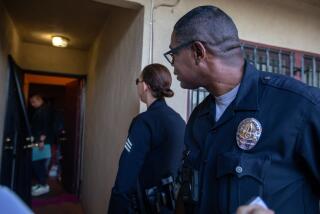Study Shows Stress Dogging Paramedics
- Share via
More than one in three Los Angeles city paramedics suffers serious stress from overwork and more than half show signs of emotional exhaustion that could affect patient care, a Fire Department psychologist warned Thursday.
Dr. Robert Scott told a Fire Commission task force that stress has invaded every aspect of paramedics’ lives. He said they complain of marital problems, rage, headaches, depression and sleeplessness. In increasing numbers, he said, they wander in with dull eyes and vacant faces, “cynical” and “bitter.”
In some cases, Scott said, spouses of paramedics are pleading with them to quit working on ambulances.
Scott said he became so alarmed by the parade of patients that he felt compelled to measure the breadth of the psychological damage.
He presented his findings--a scientific sample of 187 paramedics--for the first time Thursday. Near the end of his presentation at Los Angeles Valley College, Scott acknowledged the presence of paramedics in the audience and stated: “These people behind me need help now. They can’t wait.”
In his study, Scott found that 33% of city paramedics experienced serious stress from the intensity and long hours of the job, and that an additional 21% were at risk of serious stress. At the same time, 56% had high levels of emotional exhaustion.
His assessment is the latest in a recent series of critical reviews of the agency’s paramedic network, which officials say is in crisis.
The presentation came one day after Mayor Richard Riordan moved to address the concerns raised by Scott and others, announcing an emergency initiative to hire 100 paramedics over the next six months. The aim is to reduce heavy workloads and forced overtime, which have contributed to record high attrition among paramedics.
A key part of that recruitment plan must still be sanctioned by the U.S. Justice Department, which in 1974 obtained a court order forcing the Fire Department to recruit within city limits as a way to increase diversity. On Wednesday, Riordan asked Atty. Gen. Janet Reno to waive that requirement. Justice Department officials have been unavailable for comment.
During his lengthy presentation, Scott praised the mayor’s plan as a good first step but said more needs to be done, such as ensuring that paramedics get regular breaks and are regularly rotated out of the busiest stations. Some rescue crews, he said, respond to 20 calls in a 24-hour period, a grueling pace that can leave little time for sleeping or eating.
Fire Chief William R. Bamattre, who was on hand for the psychologist’s presentation, agreed that workloads must be reduced but said that “it’s not an easy problem to solve.” He said seniority rules and other personnel factors limit the department’s ability to move paramedics between slow and busy stations.
The Fire Commission panel on Thursday also continued to explore other problems that critics have said are undermining paramedic effectiveness. Among the most persistent: mistakes in dispatching the necessary level of medical care to emergency calls.
The Times has reported that improper dispatches have been tied to at least five cases since February in which patients died. The most recent of those occurred last month in Tujunga, when three dispatchers seriously bungled a call for help from a man whose fiancee was passed out and bleeding.
In that case, the dispatcher who first took the call went on a break without passing along the information. He was relieved by a dispatcher who killed the call from his computer. A third dispatcher misgauged the severity of the emergency and ordered a lower level of help than was required.
On Thursday, fire officials assured commissioners that they had fixed at least part of the problem, programming the dispatch computer to prevent calls from being dropped before rescue squads are sent.
One of the paramedics who responded to the Tujunga call, Robert Ashley, told the panel he was upset by a supervisor’s remark after the incident that the mistakes “really didn’t matter” because the woman could not have been saved.
Such comments, Ashley contended, reflect a pervasive attitude within the department toward emergency medical care. “I’m tired of accepting mistakes,” he said.
His sentiments were echoed by another veteran paramedic, William Ramsey. The department excels at putting out fires, he said. “But when it comes to [emergency] medicine,” he told commissioners, “I don’t think they could manage a lemonade stand.”
More to Read
Sign up for Essential California
The most important California stories and recommendations in your inbox every morning.
You may occasionally receive promotional content from the Los Angeles Times.











